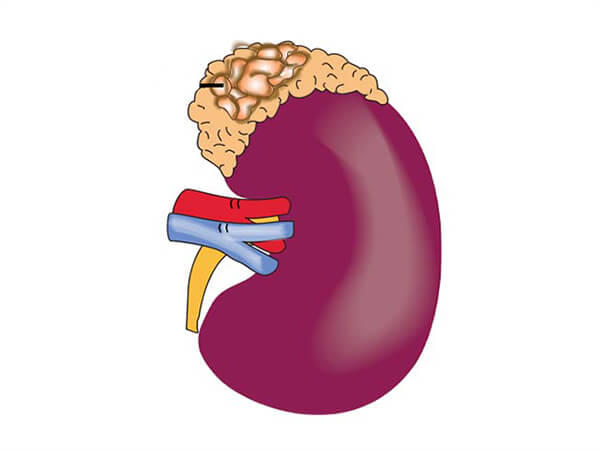Analysis of rare endocrine cancer reveals novel genetic alterations
- Posted:
240-760-6600

Malignant tumors growing on the surface of an adrenal gland which sits on the top of a kidney.
Credit: TCGA Research Network
In the most comprehensive molecular characterization to date of adrenocortical carcinoma, a rare cancer of the adrenal cortex, researchers extensively analyzed 91 cases for alterations in the tumor genomes. They identified several novel genetic mutations as likely mechanisms driving the disease. They also found that whole genome doubling, wherein a cell has one or more extra sets of chromosomes, as a probable driver of the disease. The study, by The Cancer Genome Atlas (TCGA) Research Network, was led by Roel Verhaak, Ph.D., MD Anderson Cancer Center, Houston, and appeared in Cancer Cell, May 9, 2016. TCGA is a collaboration jointly supported and managed by NCI and National Human Genome Research Institute. This analysis supports previous findings that overexpression of IGF2, a gene encoding a peptide hormone involved in cell growth, and mutation of TP53, a common tumor suppressor gene involved in cell cycle regulation, are hallmarks of adrenocortical carcinoma. In addition, the study identified several novel gene mutations that likely contribute to the development of this disease. In particular, mutations in the gene PRKAR1A, found in 8 percent of cases in this study, have previously been associated with adrenocortical tumors, including both adenomas and rare carcinomas.
The study's analysis of somatic copy number alterations, or changes in chromosome structure or number that influence gene expression, revealed that copy number alterations also likely play a critical role in adrenocortical carcinoma. Whole genome doubling was observed in a higher proportion of adrenocortical carcinoma cases (51 percent) than in any of twelve other cancer types used for comparison. In addition, hypoploidy, or the loss of a significant amount of the genome, was found in a higher proportion of cases (31 percent) than in each of twelve comparison cancer types, with the exception of kidney chromophobe carcinoma (37 percent). The researchers propose that a common course in tumor development may be a loss of DNA, resulting in hypoploidy, followed by whole genome doubling. This mechanism could effectively rid the tumor of normal copies of genes that would prevent cancer, while duplicating genes that harbor cancer-causing mutations. The study further showed that the frequency of copy number changes was associated with an aggressive clinical course of the disease, supporting whole genome doubling as a significant contributor in driving this disease. Adrenocortical carcinoma affects less than one person per one million in the U.S. When detected early, the disease can be treated with surgery, but effective treatments for patients with later-stage disease have not yet been identified, leading to a poor 5-year survival rate of less than 15 percent for patients with the most advanced stage of the disease.